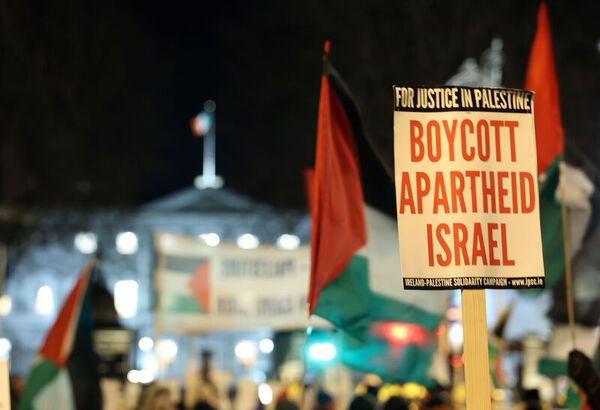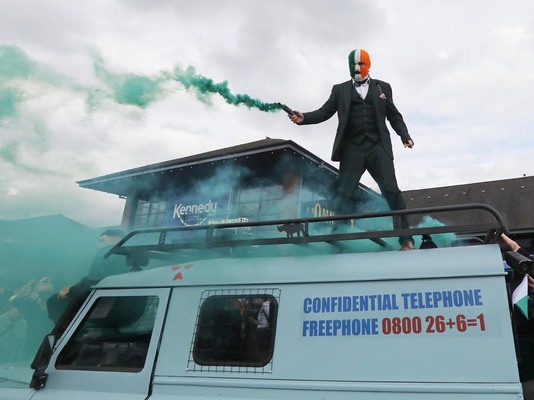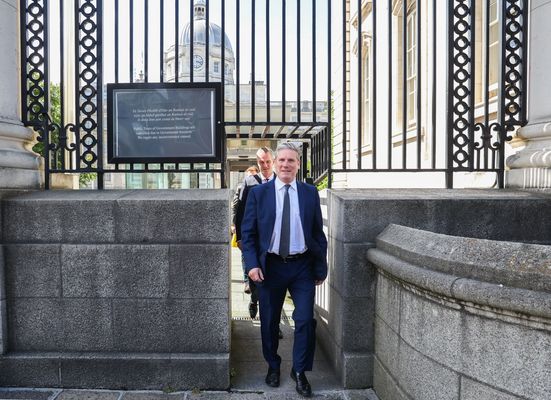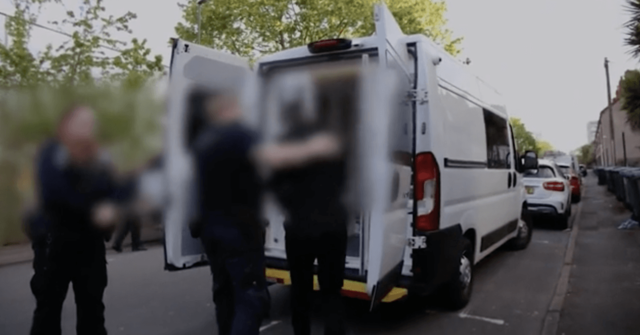Of all the coverage of the DUP’s crawl back to Stormont, one street interview stood out. It was with the woman who said she thought Michelle would do a good job. She paused and then followed with, “I’m from the other side so I shouldn’t be saying that”. But she was saying it and she was saying it quite openly to camera, knowing that family, friends and neighbours might get to see it. Not only a sign of changed times, but this is also evidence that First Minister Michelle O’Neil’s leadership has broad appeal. Her opening address at Stormont last Saturday was a powerful mix of principles, challenges and ambitions. And the humanitarian crisis on most people’s minds was also included:
“Today we are heartbroken for the suffering of the Palestinian people. I call for an immediate ceasefire. For dialogue and peace.”
Shortly before Michelle spoke, President Higgins released a comprehensive statement after a phone call with Mike Ryan, executive director of the World Health Organisation. As well as calling for an immediate ceasefire and talks on the recognition of a Palestinian state, he said: “What is at stake now … is the potential emptying out of the entire space and discourse of human rights and international humanitarian law.” The International Court of Justice has accepted that Israel should be put on trial for genocide. It has ordered the state of Israel to take “immediate and effective measures to enable the provision of urgently needed basic services and humanitarian assistance” for Palestinians in the Gaza strip, so countries that undermine aid efforts are effectively defying the ICJ and are possibly complicit in genocide.
Sinn Féin meeting with the UK prime minister. Topics of discussion understood to have been covered include flawed two way negotiation with DUP, ‘obnoxious’ elements of the command paper, and Palestine. pic.twitter.com/L1BQrGmHXp
— Amanda Ferguson (@AmandaFBelfast) February 5, 2024
Let’s hope that the First Minister lobbied Prime Minister Sunak to unfreeze UNRWA funding – and was backed up by the Taoiseach in the process. Sunak has form in cutting funds to UNRWA from his time as chancellor of the exchequer, as noted in an earlier column. In this he was following Trump’s 2018 decision to cut $200 million from aid destined for Gaza and the West Bank, a policy later reversed by Biden. So the latest UNRWA crisis has been long in the making.
SOLIDARITY: A new mural on the international wall in West Belfast demonstrating support for the Palestinian people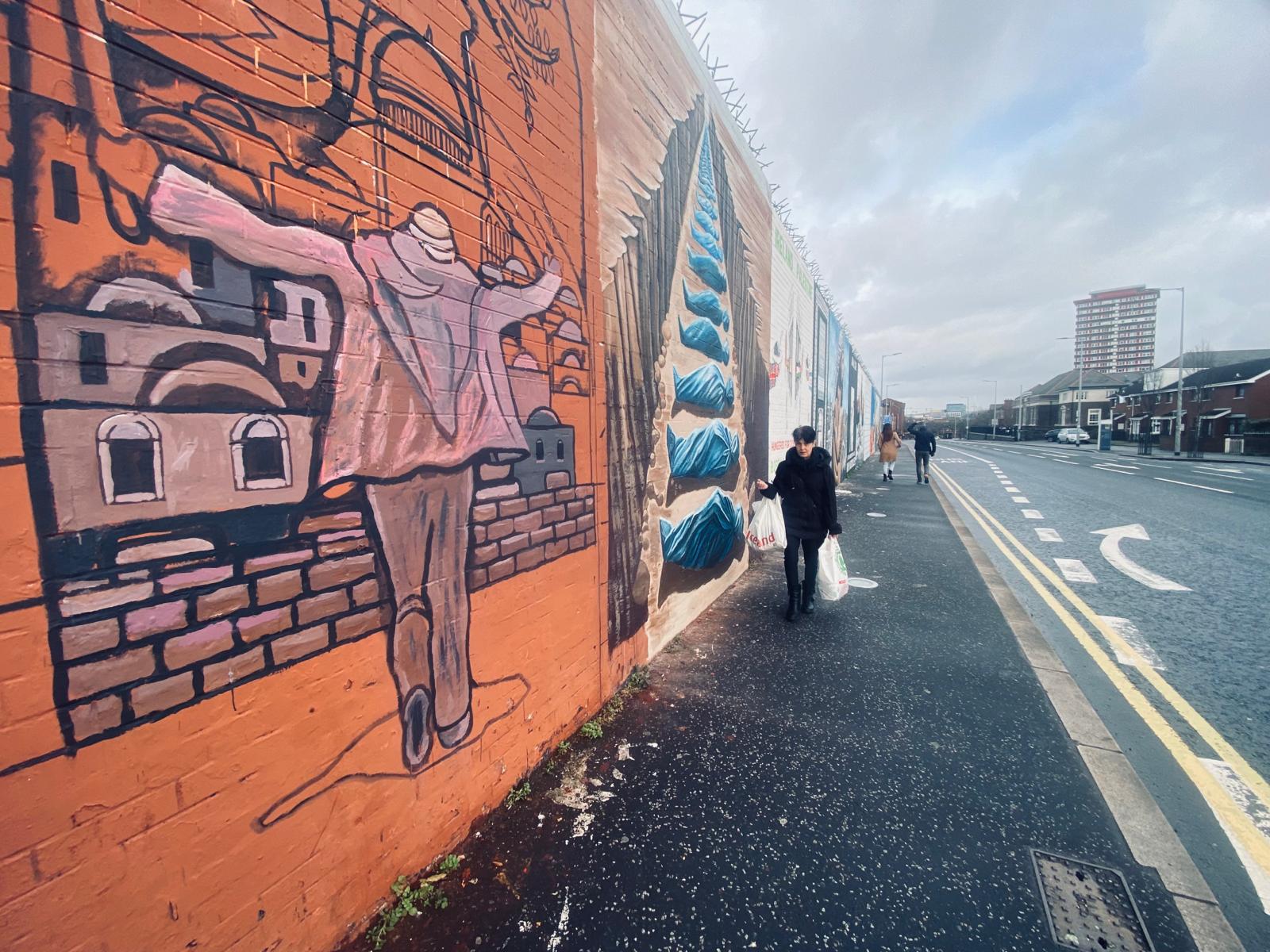
Israel’s immediate response to the ICJ ruling was to target UNRWA donor countries with a six-page confidential document which stated, “it is now possible to flag around 190 Hamas and PIJ (Palestinian Islamic Jihad) terrorist operatives who serve as UNRWA employees. More than 10 UNRWA staff were involved in the 7/10 attack on Israel” (C4 News). On the strength of this vague and unevidenced statement, nine countries immediately suspended UNRWA funding. In contrast, there has been far less attention paid to the killing of 154 of Gaza’s 13,000 UN aid workers.
We got hold of Israel’s dossier against UNRWA - why did the donors including the UK withdraw funding on such flimsy unproven allegations before an investigation?https://t.co/9ssCrIbfPK
— Lindsey Hilsum (@lindseyhilsum) February 5, 2024
A total of fifteen countries have now announced the suspension of UNRWA funding from the end of February, putting over 40 per cent of the agency’s grants in jeopardy. But other countries, including Ireland remain committed to UNRWA. Some, like Spain and Portugal, have announced increases in funding. But defiance of Israel can come at a price; after Belgium said it would continue to support UNRWA, the IDF bombed the offices of the Belgian Agency for Development Co-operation in Gaza.
The office building of @Enabel, the Belgian Agency for Development Cooperation, in #Gaza has been bombed and is completely destroyed.
— Caroline Gennez (@carogennez) February 1, 2024
Attacking civilian buildings is and remains totally unacceptable.
Together with @hadjalahbib, I will summon the Israeli ambassador. pic.twitter.com/CYnsrPhdtA
Aid is literally under attack in other ways. Settlers are gathering at crossing points in an attempt to block aid trucks from entering the Gaza strip. They have succeeded in holding up more than 130 trucks so far. According to Haaretz, protesters were filmed accosting Arab truck drivers, with one heard shouting “I’m the master, you’re the slave” – more echoes of the far right fanaticism on show at the “Victory of Israel” conference held in Jerusalem on 28 January. Attended by twelve government ministers, the conference – rally is a better term – heard speakers call for Gaza to be starved of aid, for Palestinians to leave and for the Jewish resettlement of Gaza (Jerusalem Post). Here is yet more evidence of the Israeli state’s failure “to take all measures within its power to prevent and punish the direct and public incitement to commit genocide in relation to members of the Palestinian group in the Gaza Strip” (ICJ ruling). No doubt what was said at the Victory of Israel event has been added to the Law for Palestine database of more than 500 instances of Israeli incitement to genocide (last updated on 15 January).
Israeli settlers attack aid trucks at Karm Abu Salem border crossing today, stopping them from entering Gaza.
— Howard Beckett (@BeckettUnite) February 6, 2024
Children are literally being reported as dying of starvation.
These settlers are war criminals. As are those taking funding off UNRWA.
pic.twitter.com/cSZsGikWCr
The attacks on UNRWA are not only about Gaza and the West Bank as UNRWA provides essential services – water, sanitation, schools, medical facilities, food etc – to around six million refugees across Lebanon, Syria and Jordan, as well as in the occupied Palestinian territories. Understanding the history of this responsibility means going back to the contested partition of Palestine and the creation of the state of Israel.
UNRWA – the United Nations Relief and Works Agency – is one of the oldest UN agencies. It was set up in 1949 following the Nakba (catastrophe), the forcible dispersal of 800,000 people – more than half of Palestine’s indigenous population – during the Arab-Israeli war that erupted as Britain withdrew and Israelis fought to establish an independent state. Many Palestinian urban settlements and over 500 villages were destroyed. The violence of the Nakba marked the end of the British mandate to administer Palestine that had been granted by the League of Nations (forerunner of the UN) in 1922.
As well as serving Britain’s imperial interests in the Middle East, the mandate included the requirement that the British put into effect the Balfour declaration of 1917 – the promise to “view with favour the establishment in Palestine of a national home for the Jewish people”. The mandate was a green light to Zionist colonisation through a policy of immigration, land purchase and settlement. The tensions this policy generated with the Arab population, increasingly resentful of the British authorities, boiled over in the Arab Revolt 1936-39.
At the start of the mandate, the British had only a handful of police in Palestine. That changed radically after Churchill dispatched hundreds of Black and Tans, ex-Auxiliaries and former RIC officers from Ireland to Palestine under the leadership of his good friend Sir Henry Hugh Tudor, a key figure in heading up policing at a critical point in the Tan War.
Tudor, a British Army Lieutenant General, was number two on the IRA’s death list, second only to Sir Henry Wilson. His task in Palestine was to develop paramilitary policing and to apply British power as and when needed. He was assisted by ex-RIC officers including Douglas Duff, immortalised in the phrase ‘to duff someone up’, originally referring to the abuse of suspects and prisoners. If you have the stomach for it, the brutality and terrorism of British forces during the mandate is detailed in Caroline Elkins’ recent history of the British empire, Legacy of Violence.
1. In the autumn of 1938 British soldiers arrived in the village of Al-Bassa in northern Palestine. They rounded up villagers and burned down homes. Troops later forced men onto a bus and blew it up by making them drive over a landmine. Eid Haddad’s parents lived there pic.twitter.com/yFkAzPFZt8
— Tom Bateman (@tombateman) October 7, 2022
The partition of Palestine was first proposed by the Zionist movement in 1928. This was firmed up in the Peel Commission’s recommendation (1937) to divide Palestine into an Arab state and a Jewish state. This two-state idea was passed as a UN General Assembly resolution in 1947, with strong Arab opposition. UN resolution 194 on refugees quickly followed in the wake of the Nakba. It states that, “refugees wishing to return to their homes and live at peace with their neighbours should be permitted to do so at the earliest practicable date …”
Israel opposes the right of return (and the associated compensation or restoration of property rights) on the grounds that it would make Israel unviable. And this is where hostility to UNRWA comes in. UNRWA, with its founding mission of supporting Palestinian refugees, is seen by Israel as upholding the right of return. Although Israel has had a working relationship with UNRWA for decades, it has become increasingly hostile in recent times as it accuses UNRWA of sustaining Hamas materially and ideologically (through educational materials).
Meanwhile, failure to stop the war has led to famine in Gaza and food aid has become a weapon in that war.

